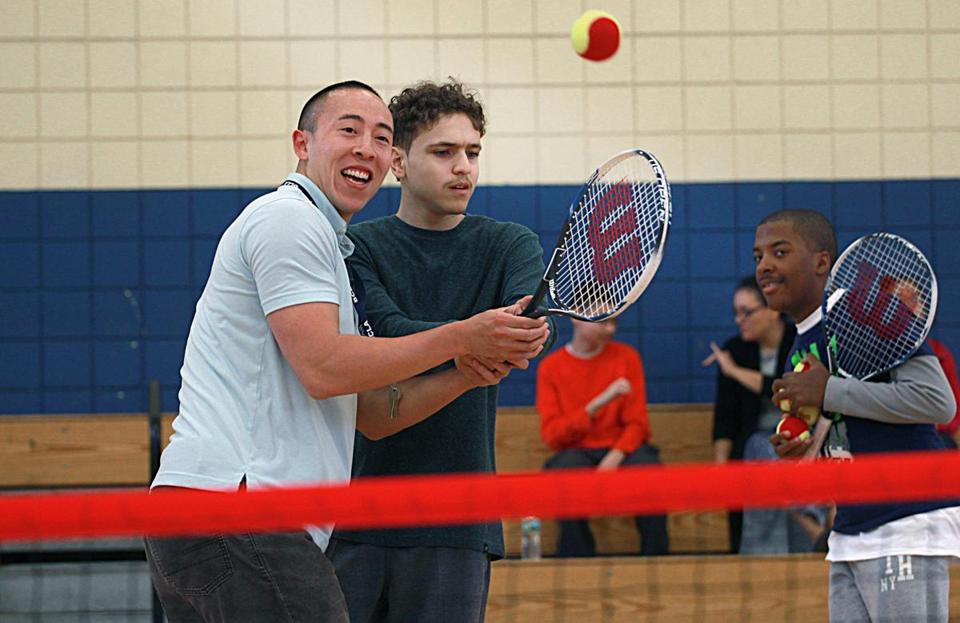By Mina Corpuz GLOBE CORRESPONDENT

Teacher Dan Ancheta (left) helped Henrique “Ricky” Bynum hit a ball over the net. Photo: SUZANNE KREITER/GLOBE STAFF
A new tennis program at Boston Community Leadership Academy is helping students with autism hone their athletic and life skills.
In the two months since the tennis clinics began, 35 students at the Hyde Park school have learned about patience, self control, and attentiveness to directions through sport, said Toni Wiley, executive director of the Sportsmen’s Tennis & Enrichment Center in Dorchester. The club has partnered with BCLA to coach students.
“Tennis is kind of a unique sport in that there is a lot you can use off the court,” Wiley said. “It’s a great sport to begin as a way of encouraging the type of behavior you want kids to see in their everyday life.”
BCLA headmaster Brett Dickens said that in addition to cultivating social skills, the program will help instill students with an appreciation for the sport and a healthy lifestyle.
About 5 percent of BCLA students have autism, Dickens said. The tennis program is one of the largest of its kind for students with autism at the high school level, she said.
The clinics run twice a week for one hour, Dickens said.
“We start teaching them the basics of tennis,” said Mark-Anthony Kenney, 21, a Sportsmen’s coach who teaches the Thursday program. “How to hold the racket, how to swing the racket, what to do with your feet when the ball is coming, just simple things.”
Kenney, who graduated from BCLA in 2013, said the program helps children with autism adapt to social environments outside of their comfort zones and learn to respect each other’s space.
While matches can sometimes get competitive, the atmosphere at the program is usually relaxed and light-hearted, he said.
“The kids are usually laughing, smiling, running around, talking to each other,” Kenney said. “It’s a very fun environment.”
The idea to launch the program started in October 2015 when students got a chance to participate in a clinic, according to Dickens. BCLA later applied for a $2,500 grant from the US Tennis Association to buy equipment.
“It is an enriching sport that builds self-confidence,” Dickens said. “It’s good that it’s not a contact sport. You learn the skills on your own, and with students with disabilities this is a good way to learn.”
In February, the school was approved for the grant and by April, students began coming to the clinics, Dickens said.
Looking ahead, she said BCLA may apply for the same grant or look to introduce the program schoolwide.
“It’s a lifelong sport,” she said. “It’s great that the USTA isn’t just about building college athletes and champions.”
Globe correspondent Olivia Arnold contributed to this report. Mina Corpuz can be reached at mina.corpuz@globe.com. Follow her on Twitter @mlcorpuz.
